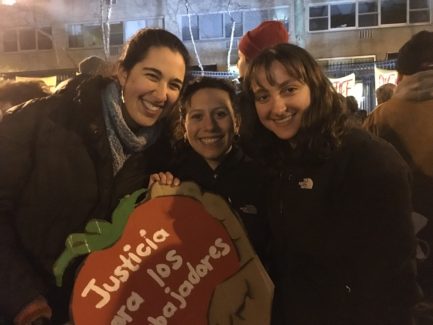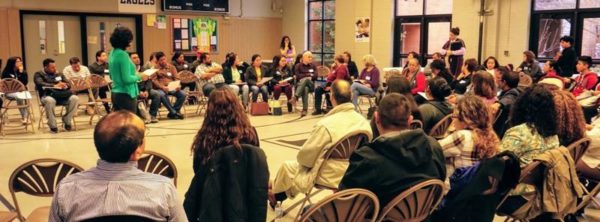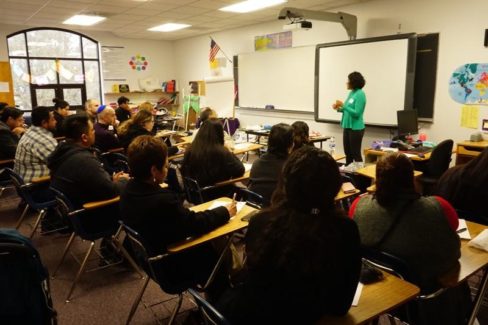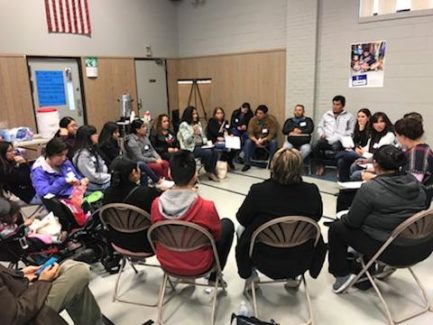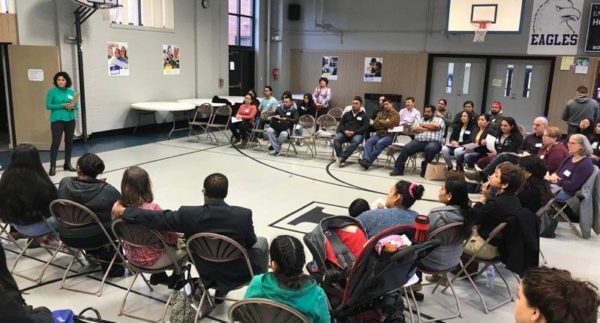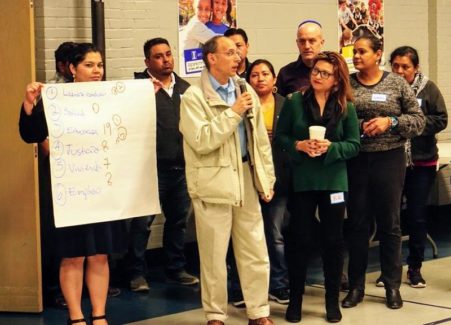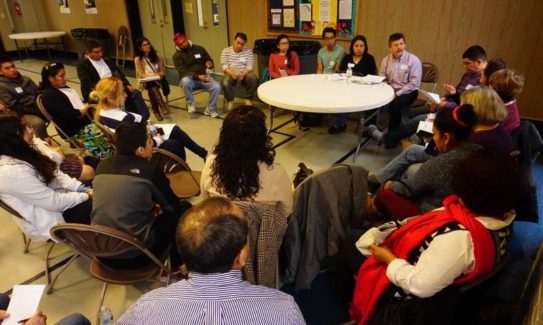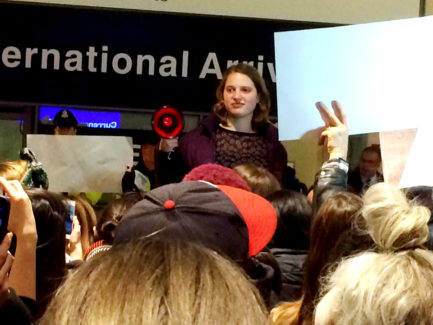 Emily Bloch, JOIN alum ’14-15
Emily Bloch, JOIN alum ’14-15
Hello Emily! Can you tell us about what you’re working on right now?
Yes, I work for an immigrant rights movement called Movimiento Cosecha, which means Harvest Movement in Spanish. We’re an immigrant rights movement fighting for permanent protection, respect, and dignity for all 11 million undocumented immigrants. I currently work and live in Texas, as part of a the Volunteer Organizer Network (VON) which is a group of full-time unpaid organizers working with Cosecha.
How did you come to this position?
My JOIN placement was with a faith-based organizing group called the Merrimack Valley Project, and through that organization I started working on a drivers license campaign for undocumented immigrants in Massachusetts. Through that work and the Momentum training community I met some of the organizers who started Cosecha, and I felt very inspired by their vision, by the urgency of the movement. Drivers licenses are such an important issue for the undocumented community, but it was clear to me too that they weren’t everything. Drivers licenses are important, but you can’t reunite with your kids or go see your family in another country with a drivers license. And so I felt like after two years at my placement working on drivers licenses and other campaigns, that I was ready to try something different, and try something bigger that I felt was looking at a different piece for how to address the issue of immigration.
Immigration is front and center in our national conversation right now. What’s it like being on the frontlines of this issue?
We decided to move to Texas when – in addition to leading the country in number of deportations – Texas passed a racist, anti-immigrant, “show me your papers” law. It felt like if we were going to be working on these issues, it was important to be working on them where the community was feeling the highest impact. Even though I was doing this work before, doing it now in Texas has added a new level of understanding of the pain that this country’s immigration system puts people through. The whole country is focused on the DREAM act, and DREAMers, and undocumented youth, and obviously we want permanent protection for undocumented youth. We also know it can’t come at the expense of criminalizing the rest of the 11 million undocumented immigrants. I think being in Texas, in a border state, I’ve been learning from the people who live here and deal with the daily reality of what enforcement means and what the border wall really means. Getting to know people and work with people who live with the border in their daily lives is so different than the hypothetical trading and bargaining of people’s lives that happens in Washington.
As organizers we often look for or towards root causes. What do you think are some of the root causes for how our country handles immigration?
That’s a great question. I don’t know if I know the answer, but I could give you my opinion! [laughter] I think if you learned about the history of immigration from Mexico into this country with the Bracero Program, this country viewed immigrant labor coming from Mexico and Latin America as temporary labor, and never people that were supposed to become a part of the fabric of this country. And I think that has everything to do with racism, and the ways that racism has played out throughout this country’s history. Under the Obama administration we saw the highest number of deportations of any previous president, so it’s not like we’re facing a new challenge, but we are facing a new political moment. And I think the reality is that this country needs our immigrant community. We still have this framework of whether we want or don’t want immigrants, but that’s not really the question. The thing is that we need immigrants in this country, that this country runs on immigrant labor, that immigrants are an integral part of our communities and our economy. Until we understand that, and until this country is forced to recognize that, we’re still going to be having this debate on a false premise, of whether we want immigrants or not. And really that premise is all about, in my opinion, the racism and colonialism of who is ‘worthy’ of being in this country and who or is not wanted.
What are some of the organizing techniques you’re using?
Cosecha is a non-violent movement. We believe that we need to use major political moments to get huge numbers of people on the streets and change the narrative around immigration, and we also know that we need trainings and on-the-ground organizing to create a leaderful movement that can sustain and support itself. Right now we are doing lots of local campaigns, actions and trainings to grow support for Cosecha across the country, eventually leading to a 7-day strike of immigrants and allies, that shows this country that it depends on immigrants. We know that immigrant communities can’t rely on politicians to get what they want, that we have to organize together in order to win.
You were one of the presenters this past fall for a live session of JOIN’s online training course Don’t Kvetch, Organize!, where you spoke about allyship. Could you share any of your guiding principles for how to show up as an ally?
I think the thing that I always try to think of, for allyship and Cosecha, is – are we following the leadership of the undocumented community? And for Cosecha that means following the strategy and what we call the Principles of Cosecha, which are 14 guiding principles that form the backbone of Cosecha. So we’re following the leadership of the undocumented community by following those principles and respecting them, both in the letter and spirit of how they were written. Then I ask, is this getting us closer to the 7 day strike? Is this getting us closer to a movement of mass non-cooperation of immigrants and allies?
Tell us about how you arrived at JOIN. How did you discover the Fellowship?
I was the JOIN class of 2014-15. I grew up in Boston and knew a lot of people who did JOIN, and I was moving back to Boston after living in Seattle. I knew that I wanted to be an organizer, I knew I wanted Jewish community, and I knew that I wanted to be in Boston. So it felt like such an obvious choice for me, in terms of knowing that those were things in my life that I wanted to prioritize. And I had also met a lot of people along the way who had done JOIN and encouraged me to apply.
Is there a story or particularly meaningful experience that has stuck with you?
I think the thing that stuck with me most was just a moment of tension that our JOIN class had at our second retreat. It was the first time we had really talked about Israel and Palestine as a cohort. Although it was clear that we all came from a deep place of wanting freedom and dignity for everyone in Israel/Palestine, we struggled to find a common framework to do that work and have that conversation. I remember the deep compassion that I felt my cohort was trying to have for one another, and both how it felt so simple and complex at the same time. So simple because I knew on some deep human level everyone in the room wanted everyone to be able to lead a life of dignity, and so complex because despite that being true the history of Israel/Palestine and the history of the Jewish people, made it so hard for us to find common ground.
Lastly, is there a kernel of organizing wisdom and / or a Jewish teaching that feeds or nourishes your work?
Well, an organizing lesson that I have to learn over and over again is that organizing is always about people. And you fight for things because it’s with people, and you fight for things for people. And as soon as we lose sight that we’re doing this for people, the work loses its importance and urgency. That’s something I’ve been thinking about recently.
Emily Bloch is a community organizer with Movimiento Cosecha and a Jewish Organizing Fellowship alum ’14-15






